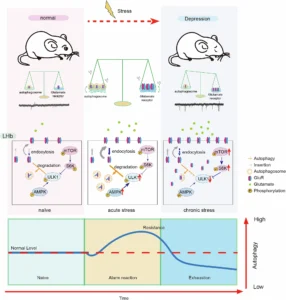
Chronic stress is not just unpleasant; it degrades human health in several ways. One effect of chronic stress is increased susceptibility to depression, which itself exerts damaging effects on health and wellbeing. Neither of these conditions is deeply understood, and so perhaps it is unsurprising that the link between chronic stress and depression is unclear.
A recent paper in Nature provides interesting and useful clues to that link, in a set of experiments that journey from effects of antidepressants to basics of neuronal cell biology. The connection is in the machinery of autophagy (literally “self eating”) in which parts of a cell are digested in a recycling and reclamation process. The authors show that autophagy is central to stress and depression, specifically in neurons of an emotion-related brain region (the lateral habenula, or LHb). They find that acute stress activates autophagy in that region, but chronic stress (a model of depression in mice) does the opposite. Consistent with that fact, they show that autophagy in the LHb underlies antidepressant effects of various drugs, from antidepressant drugs themselves to metabolic inhibitors that (interestingly) also exert antidepressant actions. They then show that genetically inactivating autophagy—specifically in the LHb—causes depression-like effects. After several additional great experiments, the authors conclude: “our study proposes a fascinating possibility that LHb autophagy serves as a new cellular target of rapid antidepressants.”
Basic research by hard-working scientists all over the world is steadily eroding the power of scourges like depression.
Stress dynamically modulates neuronal autophagy to gate depression onset
In Nature, 9 April 2025
From the groups of Yihui Cui and Xiangnan Zhang at Zhejiang University.
Snippet by Stephen Matheson
Image credit: Extended data Figure 15 from Yang et al. cited above (CC BY-NC-ND)